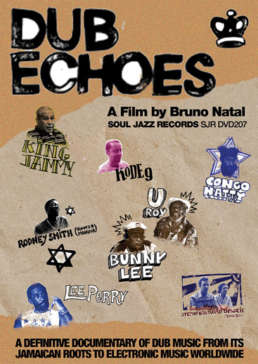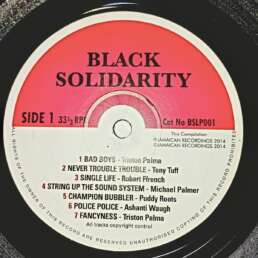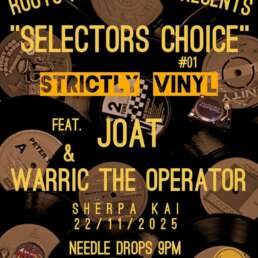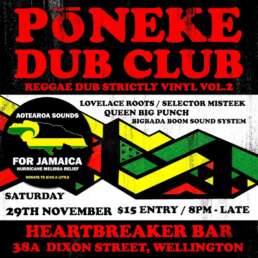Dub Echoes is a documentary directed by Bruno Natal (Brazil) that traces the origins of Jamaican dub music and its huge influence on the development of other musical forms including hip-hop and electronica. It chronicles the evolution of sound and bass and shows how the Jamaican invention called dub has influenced much of the music we hear today and transformed the studio into a musical instrument.
The film was completed in 2008 and is due for release through Soul Jazz Records (UK) in May 2009. The Australasian Premier Screening of Dub Echoes will take place on Saturday 9 May @ The NZ Film Archive, Wellington. NiceUp spoke to Bruno Natal about how the film evolved, some of the challenges and highlights of the process and how the film is being received around the world.
Bruno, can you tell us a bit about your background and how you got into film?
I’m a journalist and documentary-maker. As a writer, I work as a freelancer for Brazilian newspapers and magazines, as well as international publications such as Vice, XLR8R, Urb and Spin.
As a documentary-maker, I have a production company which is responsible for all my works, called Videograma. Since I was a kid I have always liked playing with video cameras!
Dub Echoes was the first documentary I began, but it took four years to finish it. It was a big project and it took a long time to get it completed, especially because of the low budget we worked with. It was all done by a group of friends who work in video production, in our spare time. It was a labour of love, really.
Because of that, I end up commercially releasing five other documentaries, all about Brazilian music and artists, before completing Dub Echoes.
What gave you the inspiration to put together Dub Echoes?
The researcher, Francisco ‘Chicodub’ Linhares and I have always loved dub very much and we would talk about the influences it has had over other styles of music and how this mostly goes unnoticed in the mainstream media. You hardly hear about dub music outside of music producer and reggae fan circles. We thought this was a point that was worth being made and just decided to do it.
It all started when we were invited by another friend, Felipe Continentino, who was then a photographer and now is a director, to work on a fashion catalog he was gonna shoot in Jamaica. He knew about our love for the music and the culture and invited us on this great trip. Once everything was set, the three of us decided we would take the money we were paid for the job and stay longer in Jamaica and try to interview some people. It worked out and it all started from that.
We had the support of American Airlines who gave us the plane tickets so we were able to fly to the US and London to interview the rest of the people we wanted.
Did you work with a big crew? How long did the project take?
It was only Chicodub and I traveling, with just one camera and no lights. It took over three months to film it, in between all the trips. But it took four years to edit and finalize it.
Daniel Ferro, Julio Adler and Rafael Mellin did the edit – they are great friends and they have edited all of my documentaries so far. Mellin Video supported Dub Echoes’ with equipment and crew.
Adriano D’Aguiar and Juarez Escosteguy did the motion graphics at Brabo TV studio. Emilio Rangel did all the illustrations and lettering in his studio, 6D. And Antonio Pedro Rezende worked on the logo and website through his studio, Dimaquina.
Marcus Paulo Cientista, MPC, from Rio de Janeiro’s Digitaldubs Soundsystem, composed original tracks for the film. And Joo Brasil did audio post production at his studio, Lontra Music.
You are from Brazil – what is the dub scene like over there?
It’s quite small, dominated by a couple of groups, such as Digitaldubs Sound System and Echo Sound System.
Who are your favourite artists?
In dub? The holy trinity – King Tubby, Lee Perry and Augustus Pablo. Kode9, Keith Hudson and Linval Thompson. From the modern stuff I like Burial, Twilight Dub Circus, G-Corp, Kode 9, Mad Professor…
What were some of the challenges you faced while making Dub Echoes?
Not having a budget, for sure! We just paid for everything ourselves. Making an independent film is tough.
What were some of the stand-out moments for you in putting this film together?
Just getting to meet all these people to talk about dub was great! But meeting Lee Perry, who was the last person interviewed, years after the beginning of the project, made everything click and feel right.
Who were your favourite interviews with?
I think they are all equally important, but the Jamaicans we interviewed add a special flavour to it. Lee Perry, Bunny Lee, Scientist, Sly & Robbie…these guys are Jamaican music history.
Soul Jazz Records, UK, are distributing the film worldwide – how did this come about?
I had gotten in touch with Soul Jazz years ago, in the very beginning, to check if they had any footage we might be able to use, cover art, etc, and they were very supportive. When the film was finished I was living in London and asked if they wanted to see it. They watched, liked it and decided to release it. It was all pretty simple actually.
How has the film been received around the world?
It has been a great ride! The film has been selected for more than twenty festivals in over eighteen countries!
Any words for the massive?
Thanks for the opportunity to talk about the film and for checking out Dub Echoes! Check out the Dub Echoes website to get updates.
Dub Echoes Australasian Premier Screening
Saturday 9 May @ The NZ Film Archive, Taranaki Street, WGTN
6.30 nibbles provided by Calypso Caribbean Cafe
7pm start
$8 waged/$6 unwaged
More info:
Dub Echoes website
Big up:
NZ Film Archive
Radio Active 89FM
Calypso Caribbean Cafe
Soul Jazz Records
Southbound Distribution
Venus Hi Fi
Related posts
Triston Palma – Bad Boys – Track of the Week
November 17, 2025
Selectors Choice – Sat 22 Nov
November 12, 2025
Pōneke Dub Club – Sat 29 Nov
November 11, 2025




